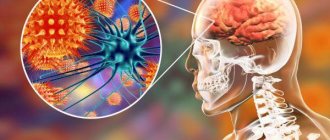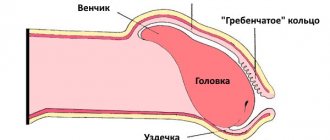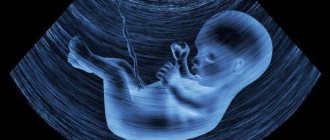Among the symptoms indicating the presence of neurological disorders, the most common are cognitive disorders, which arise as a result of pathological changes in the structure and functioning of the brain.
This problem mainly occurs in older people. The high incidence of cognitive disorders in this category of patients is explained by age-related changes in the body, which negatively affect the functioning of the central nervous system.
Cognitive impairment refers to a decrease in memory, mental capacity and other intellectual functions. Such changes are identified by comparing current indicators with the individual norm.
Cognitive brain functions - what is it?
Cognitive (cognitive) functions are the most complex processes occurring in the brain. They provide a rational perception of the surrounding reality, an understanding of the events occurring around a person. Through the cognitive abilities of the brain, people find connections between themselves and what they encounter in everyday life.
Cognitive activity consists of the following functions:
- Memory . This term refers to the special ability of the brain to assimilate incoming information, store it and, if necessary, reproduce it.
- Gnosis . This function is responsible for the perception of incoming information from the outside world. Gnosis refers to the brain’s ability to process data and synthesize the simplest sensations coming from all senses into holistic structures.
- Speech . This concept refers to a person’s ability to exchange previously acquired information through statements.
- Praxis . This term refers to a person's ability to acquire and retain new motor skills and then use them in everyday life.
- Intelligence . It refers to the ability to compare incoming information, find commonalities and differences. A person’s ability to make judgments and draw various conclusions on a particular issue depends on the level of intelligence.
Problems with memory and intelligence occur when any part of the brain is damaged. Violations of other cognitive functions occur when certain parts of the central nervous system are damaged (parietal, frontal, temporal and other lobes).
Three stages of cognitive impairment
Such violations are usually classified according to the severity of the consequences. Cognitive disorders may be of the following nature:
- With mild disorders, minor changes are observed that fall within the established norms for a specific age group. Such disorders do not create problems for a person in everyday life. At the same time, people themselves or those around them may notice such changes.
- Moderate by changes in cognitive functions that go beyond existing norms. However, such violations do not affect the person’s condition and do not cause maladjustment in his everyday life. Moderate disorders usually manifest themselves as problems in performing complex intellectual tasks.
- The most dangerous type of cognitive personality disorder is dementia, or dementia . This condition is accompanied by significant changes in memory and other brain functions. Such disorders are pronounced and have a direct impact on a person’s daily life.
List of distortions
Cognitive distortions are systematic errors in thinking that occur in certain situations. Template deviations or patterns are an example of mental behavior that has developed at the evolutionary level.
Distortions of this type may arise due to the need to adapt to a certain situation or the lack of specific thinking skills.
Eliminating this problem is a separate direction in psychotherapy and the main object in cognitive psychotherapy. In total, over 120 cognitive distortions were recorded , divided into several groups.
Distortions related to decision making and behavior in certain situations :
- irrational strengthening (attachment to the direction chosen earlier);
- amplification (an excessive amount of effort is put into drawing up a plan to achieve a goal);
- submission to authority (a person is not able to be guided by his own opinion and obeys a specific person who he considers an authority);
- non-acceptance of loss (the frustration from the loss exceeds the joy from finding the same object);
- etc.
Distortions based on stereotypes :
- the effect of excessive confidence (a person significantly overestimates his capabilities and skills);
- illusion of clustering (the presence of a tendency to see patterns-images where they are absent);
- cascade of available information (distortion is a collective belief in facts that have been stated repeatedly);
- telescope effect (incorrect orientation in time, recent events are perceived as distant and vice versa);
- illusory correlation (the presence of an erroneous belief in the relationship of any events or actions that do not actually exist);
- etc.
Distortions caused by the social environment :
- halo effect (when perceiving a person, one fact plays a key role, for example, attractive appearance is associated with an ideal character);
- distortion in favor of one’s group (a person listens only to the opinions of those whom he considers to be members of a certain group);
- distortion of a homogeneous assessment of people from another group (members of their group have a more impressive set of abilities and skills than representatives of other groups);
- illusion of transparency (distortion in overestimating other people's understanding and overestimating one's own ability to understand them);
- etc.
Distortions caused by memory impairment :
- cryptomnesia (in a broad sense, distortion is the false attribution of one's own authorship);
- retrospective distortion (past events are filtered through reality, falsely imposing predictability on certain situations);
- benefactor (a person takes responsibility for favorable outcomes of events and denies his participation if the outcome becomes negative);
- apparent constancy (a person retains certain positions of the people around him in his memory, but at the same time he does not allow the possibility of their change);
- egocentric distortion (exaggeration of past results, events appear brighter than they actually were);
- etc.
Briefly about cognitive distortions, the reasons for their occurrence and classification in this video:
Complex of provoking factors
There are more than 10 different factors that can lead to cognitive disorders of brain function. The most common cause of such disorders is Alzheimer's disease. This pathology is accompanied by the gradual death of brain neurons, as a result of which its individual functions are suppressed.
The first and most striking sign of Alzheimer's disease is memory loss. At the same time, motor activity and other cognitive functions remain within normal limits for a long time.
In addition to Alzheimer's disease, a decrease in a person's intellectual capabilities is observed in the following neurodegenerative pathologies:
Quite often, cognitive disorders can manifest themselves in vascular diseases of the brain. These include:
Basically, dementia and other forms of psychoneurological disorders are caused by a combination of vascular pathology and circulatory failure in the brain. The risk group for developing such complications includes people who have been diagnosed with:
- atherosclerosis;
- hypertension;
- arterial hypertension.
Cognitive deficits can also develop with the following diseases (although with much lower risks than in the previous case):
Among the probable causes of the development of psychoneurological disorders are severe poisoning and long-term use of psychotropic substances. Head injuries can also lead to dementia and mild impairment of brain function.
Clinical picture
The intensity of the clinical picture is determined by the severity of the lesion and the location of the pathological process in the brain. In most cases, several types of cognitive disorders of varying severity and intensity are observed.
Neurological diseases manifest themselves in the form of the following phenomena:
With dementia, patients lose the ability to critically assess their own condition, and therefore, when interviewed, they do not complain about the above symptoms.
The first sign indicating a cognitive deficit is memory loss. This symptom occurs even with mild forms of brain dysfunction. At the initial stages, the patient loses the ability to remember information that was received relatively recently. As the pathological process develops, he forgets events that happened in the distant past. In severe cases, the patient is unable to say his own name and identify himself.
Symptoms of disorders with moderate brain damage often go unnoticed. Such disorders are sluggish in nature and do not transform into dementia. The presence of moderate disorders can be determined by the following symptoms:
- difficulties in performing simple counting operations;
- problems repeating recently learned information;
- disruption of orientation in a new area;
- difficulty finding words during a conversation.
A mild form of cognitive impairment is indicated by:
- memory loss;
- problems with concentration;
- high fatigue when performing mental work.
Cognitive impairment must be differentiated from other forms of neurological disorders. In particular, to make a correct diagnosis, it is necessary to establish the presence or absence of pathological changes in a person’s behavior and emotional state.
Complications
Mild cognitive impairment with a progressive course, if untreated, quickly leads to the development of dementia. Patients lose the ability to solve everyday problems and need help with self-care. Socialization is disrupted - the circle of contacts is narrowed, patients cannot perform professional duties or attend social events. With a fluctuating course of the disorder, patients experience difficulties while performing intense mental tasks, but with proper correction of the regime and reduction of stress, they retain their usual life activities.
Brain dysfunction in children
Children experience cognitive dysfunction due to a deficiency of certain vitamins.
Modern research has proven the relationship between cognitive impairment and a lack of beneficial microelements in the body. Vitamin deficiency negatively affects the ability to remember new information, concentrate, the intensity of the thought process and other types of brain activity.
Pathologies caused by a lack of microelements occur in approximately 20% of children and adolescents. In most cases, problems related to speech and language functions are observed.
In addition to vitamin deficiency, neurological diseases in children occur for the following reasons:
In the latter case we are talking about:
In this regard, one of the main challenges facing modern medicine is the development of methods for early diagnosis of cognitive disorders in children.
Diagnostic criteria
Diagnosis of malfunctions in brain functions is carried out if the patient or his immediate relatives consult a doctor with complaints of memory loss and deterioration of mental abilities.
A study of a person's current state is carried out using a brief mental status assessment scale. In this case, it is important during diagnosis to exclude the presence of emotional disorders (depression), which lead to temporary memory impairment. In addition to screening scales, the patient’s mental status is assessed through dynamic monitoring of him and his behavior. Repeated examination is scheduled approximately 3-6 months after the first one.
To assess the degree of dementia, the patient is asked to draw a clock
To quickly analyze the patient’s mental state, the so-called Montreal Cognitive Impairment Rating Scale is used today. It allows you to test many brain functions in about 10 minutes: memory, speech, thinking, counting ability and more.
The assessment is carried out by testing the patient. He is given tasks and a certain time to complete them. At the end of the tests, the doctor calculates the final results. A healthy person must score more than 26 points.
The MMSE scale is used in stroke to detect cognitive impairment
How do cognitive impairments manifest?
Cognitive impairment, what is it? In order to answer this question, let's look at what cognitive functions are. This concept reflects the ability to perceive and assimilate received information . In addition, cognitive functions include intelligence, the ability to navigate time and space, competent expression of one’s thoughts and motor skills.
At a certain period of life, a person encounters a problem, which is expressed in various malfunctions in the functioning of the functions in question. Forgetfulness and absent-mindedness, which appear from time to time, are not yet indicators of the development of the disease. However, when a person regularly encounters the fact that certain personalities, events and names of objects “fly out of his head,” one should think about the presence of disturbances in brain activity. In order to confirm or refute the presence of a cognitive disorder, you should contact a neurologist.
How to improve the patient's condition?
When selecting a treatment regimen for a patient, it is important to first establish the cause of the development of cognitive disorder. Therefore, after assessing the mental status, a comprehensive examination of the patient is carried out.
Treatment tactics for disorders are determined based on the severity of the disease and the cause of the brain dysfunction. In the treatment of mild to moderate dementia caused by Alzheimer's disease or vascular pathologies, acetylcholinesterase inhibitors or Memantine are used. However, the effectiveness of these drugs has not yet been proven. They are prescribed mainly to prevent further progression of the pathological process and the development of dementia.
In case of diagnosing vascular pathologies that provoke a failure of brain activity, the following are used:
- phosphodiesterase inhibitors promote vasodilation, which leads to normalization of blood circulation;
- α2-adrenergic receptor blockers suppress the actions of the sympathetic nervous system, which lead to the narrowing of blood vessels.
Actovegin is used to restore neurometabolic processes. The drug increases the plasticity of brain neurons, which has a positive effect on cognitive functions.
In addition to these medications, in the presence of neurological disorders, various therapeutic tactics are used to correct the patient’s behavior. It takes a lot of time to complete this task, since such treatment involves a consistent transformation of the human psyche.
Tactics for managing a patient with impaired cognitive functions:
Treatment of mild cognitive impairment
Only the doctor should decide what therapy measures to use to improve the patient’s well-being. As a rule, complex treatment is used, because in this case it will be possible to achieve positive results much faster.
Medicines are necessarily prescribed, because with their help you can normalize a person’s condition. Nootropic drugs (for example, Piracetam or Encephabol), as well as anti-dementia drugs such as Mematin and Donepezil, are prescribed.
Vitamin and mineral complexes are prescribed, for example, Glycine has proven itself well. Agents with neuroprotective properties are recommended for humans: Mildronate and Cerebrolysin. Patients are often advised to use anti-hypercholesterolemia medications. Popular drugs prescribed include Torvacard and Simvastatin.
Psychotherapeutic procedures may be prescribed to support the body. The doctor sends them on an individual basis. In addition, a person is recommended to follow a cholesterol-free diet.
It is worth understanding that
cognitive impairment
tend to constantly progress. That is why it is important to start treatment in a timely manner so as not to worsen the situation. If complications arise, then the person will be completely maladapted. He will not be able to perform even basic actions on his own. He will constantly need outside help, he will not even be able to eat on his own. It is for this reason that you should not wait until the disorders begin to progress rapidly. Treatment should be started as early as possible, and for this you should contact a neurologist. Only a specialist can definitely say which therapy regimen will be effective in a particular situation.
Therapy is aimed at preventing dementia, slowing the rate of cognitive decline, and eliminating existing mnestic disorders. The main therapeutic measures - etiotropic, pathogenetic - are aimed at the cause of the disorder. They may include the correction of dysmetabolic disorders, vascular changes, depression, the use of antioxidants, vasoactive, neurotransmitter, antiviral drugs, chemotherapy, and surgical removal of the tumor. Common therapies are:
- Psychocorrection. To improve memory and attention, systematic exercises are used: reading and retelling texts, memorizing poems, words, drawings. Classes are conducted together with a psychologist and independently. At meetings with a specialist, new memorization techniques are mastered - the formation of semantic and situational connections, the analysis of situations and objects. The effectiveness of classes is periodically monitored and the set of exercises is adjusted.
- Drug treatment. The drug therapy regimen is selected by the doctor individually. The most common medications used to treat cognitive disorders are nootropics and metabolic agents.
- Correction of nutrition and daily routine. Middle-aged and elderly patients need to follow a diet low in fat and salt, with a sufficient supply of antioxidants. Moderate regular exercise, good sleep, and rational alternation of physical and mental stress are important. After finishing your working career, you need to remain socially active - visit clubs of interest, meet with friends, etc.
Prevention and prognosis
A general prognosis for cognitive disorders cannot be made. In each case, the consequences are individual. But provided that you seek help from a specialist in a timely manner and follow all medical instructions, it is possible to stop the development of the pathological process.
It is important to note that there are two types of cognitive impairment: reversible and irreversible. The first form can be corrected, but the second cannot.
Prevention includes measures aimed at reducing stress and increasing a person’s mental and physical activity. To avoid the occurrence of such disorders, it is recommended to regularly perform intellectual tasks from a young age.
In addition, in order to prevent dementia, vascular pathologies and liver diseases should be treated promptly, and the deficiency of B vitamins should be regularly compensated.
Symptoms of pathology
Clinical manifestations correspond to the state of cerebrasthenia: patients are externally intact, there are no gross impairments of criticism and intelligence, a slight decrease in attentional-mnestic behavior, and rapid fatigue are detected. Patients complain of forgetfulness, absent-mindedness, difficulties in remembering new material, the need to concentrate and maintain attention.
With vascular mild cognitive disorders, behavioral and emotional disturbances are observed at the onset - increased anxiety, affective instability, fussiness and absent-mindedness, mnestic symptoms appear later. Patients with degenerative pathologies of the central nervous system primarily experience memory problems.
Patients often experience headaches, a feeling of heaviness in the head, general weakness, drowsiness, and dizziness. The ailments are non-systemic in nature, varying in intensity throughout the day, and in many patients they occur in the morning and evening. Possible instability when walking, anxious and intermittent sleep, insomnia, lack of appetite, nausea.
The condition worsens after mental and physical stress. The course of MCI depends on the underlying disease, it can be fluctuating (often with cerebrovascular changes), progressive, turning into dementia (with atrophic processes, tumors, some infections) and regressive (after a stroke, TBI, acute passing infections).











